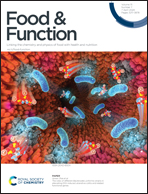Insulin resistance, combined with health-related lifestyles, psychological traits and adverse cardiometabolic profiles, is associated with cardiovascular diseases: findings from the BHMC study†
Abstract
The triglyceride glucose (TyG) index is a reliable marker of insulin resistance; however, its combined impact with modifiable lifestyle risk factors and psychological traits on cardiovascular diseases (CVDs) remains unclear. The aim of this study was to explore the relationship between the TyG index, various behavioral factors, psychological traits, and CVDs. A total of 77 752 adults aged 18 and over from the baseline survey of the Beijing Health Management Cohort study were investigated. Associations of the TyG index, body roundness index (BRI), dietary habits, psychological traits, and sleep habits with CVDs were estimated using multivariable logistic regression models. Compared to the Q1 level, the Q4 level of the TyG index had an odds ratio (OR) and 95% confidence interval (CI) of 2.30 (1.98–2.68) for CVD risk in men and 2.12 (1.81–2.48) in women. Compared to a sleep duration of more than 7 hours, a sleep duration less than 5 hours had a 32% (8%–61%) higher risk in men and 22% (1%–48%) in women. The ORs (95% CIs) for fast eating compared to normal speed were 1.47 (1.23–1.76) in men and 1.17 (1.05–1.29) in women. Compared to individuals with a passive and depressed psychological trait, those who were positive and optimistic had a 47% (36%–56%) decreased risk in men and 43% (31%–53%) in women. In the age-stratified analysis, a higher BRI level showed a sex-differential effect on CVDs, which is potentially related to a lower risk of CVDs in elderly men. A high level of the TyG index combined with unhealthy lifestyle factors indicates a higher risk of CVDs, while maintaining a positive and optimistic psychological trait acts as a protective factor. These findings may be valuable for identifying high-risk populations for CVDs in community settings.



 Please wait while we load your content...
Please wait while we load your content...